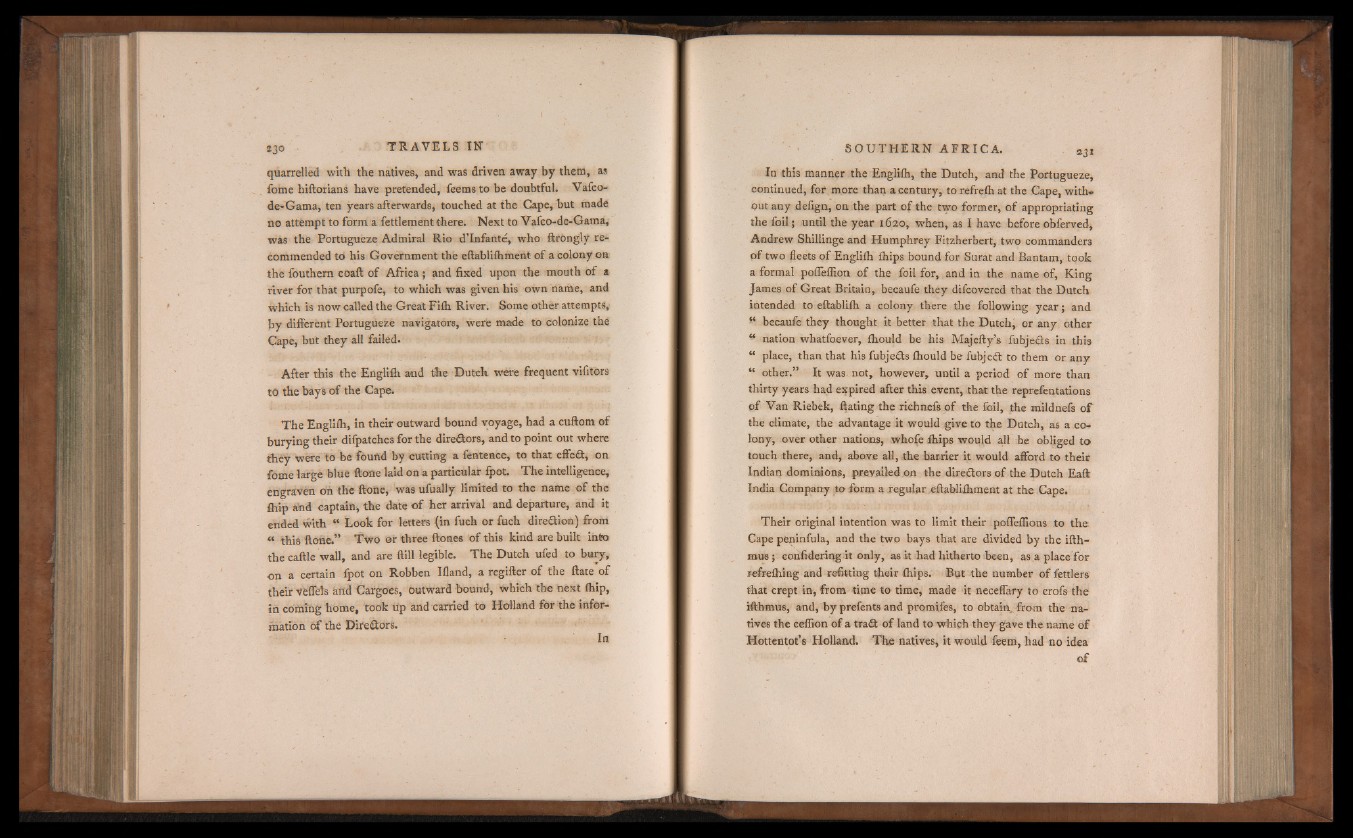
quarrelled with the natives, and was driven away by them, as
fome hiftorians have pretended, feems to be doubtful. Vafco-
de-Gama, ten years afterwards, touched at the Cape, hut made
no attempt to form a fettlement there. Next to Vafco-de-Gama,
was the Portugueze Admiral Rio d’Infanté, who ftrongly recommended
to his Government the eilabliihment of a colony on
the fouthern coaft of Africa; and fixed upon the mouth of a
river for that purpofe, to which was given his own name, and
which is now called the Great Fiih River. Some other attempts,
by different Portugueze navigators, were made to colonize the
Capé, but they all failed.
After this the Englifli and the Dutch were frequent vifitors
to the bays of the Cape.
The Englifh, in their outward bound voyage, had a cuftom of
burying their difpatches for the diredtors, and to point out where
they were to be found by cutting a fentence, to that effedt, on
fome large blue ftorte laid on a particular fpot. The intelligence,
engrávcn oñ the ftone, was uíuálly limited to the name of the
fliip and captain, the date o f her arrival and departure, and it
ended with “ Look for letters (in fuch or fuch diredfion) from
m this ftohe.” Two or three ftones of this kind are built into
the caftle wall, and are ftill legible. The Dutch ufed to bury,
on a certain fpot on Robben Ifland, a regifter of the ftate of
their veiTds and Cargoes, outward bound, which the next ihip,
in coming home, took tip and carried to Holland for the information
Of the Dire&ors.
In
In this manner the Englifh, the Dutch, and the Portugueze,
continued, for. more than a century, to refrefh at the Cape, with*
out any defign, on the part of the two former, of appropriating
the foil; until the year 1620, when, as I have before obferved,
Andrew Shillinge and Humphrey Fitzherbert, two commanders
of two fleets of Englifh ihips bound for Surat and Bantam, took
a formal pofleflion of the foil for, and in the name of, King
James of Great Britain, becaufe they difcovered that the Dutch
intended to eftablifh a colony there the following year; and
< becaufe they thought it better that the Dutch, or any other
“ nation whatfbever, fhould be his Majefty’s fubjects in this
“ place, than that his fubjedts fhould be fubjedt to them or any
“ other.” It was not, however, until a period of more than
thirty years had expired after this event, that the reprefentations
of Van Riebek, ftating the richnefs of the foil, the mildnefs o f
the climate, the advantage it would give to the Dutch, as a colony,
over other nations, whole ihips would all be obliged to
touch there, and, above all, the harrier it would afford to their
Indian dominions, prevailed on the diredlors of the Dutch Eaft
India Company to form a regular eilabliihment at the Cape.
Their original intention was to limit their poflfeflions to the
Cape peninfula, and the two bays that are divided by the ifth-
mus; coufidcring it only, as it had hitherto been, as a place for
refrefhing and refitting their ihips. But the number of fettlers
that crept in, from time to time, made it neceflary to erofs the
jfthmus, and, by prefents and pronaifes, to obtain, from the natives
the eeflion of a tradt of land to which they gave the name of
Hottentot’s Holland. The natives, it would feern, had no idea
of